|
|
|
Sort Order |
|
|
|
Items / Page
|
|
|
|
|
|
|
| Srl | Item |
| 1 |
ID:
131832
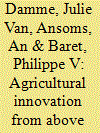

|
|
|
|
|
| Publication |
2014.
|
| Summary/Abstract |
In its 2008 World Development Report, the World Bank pleaded for a 'Green Revolution' for sub-Saharan Africa, pointing particularly to the importance of including smallholder farmers. This article focuses on the banana cropping system in Rwanda, and on the agricultural innovations introduced within this system. We first consider macro-level innovations that are designed to promote a modernized agricultural sector and that correspond to the rationale of the Green Revolution. We analyse how such 'top-down' innovations are received on the ground and show how smallholders seek to evade new government policies when they fail to reflect local economic and social realities. This demonstrates how some rural Rwandans are challenging the authority of the government in disguised ways in order to protect their local livelihoods. The Rwandan experience should inspire continent-wide Green Revolution policies to take account of the risk-coping rationale of small-scale farmers and their capacity to innovate 'from below'.
|
|
|
|
|
|
|
|
|
|
|
|
|
|
|
|
| 2 |
ID:
131835
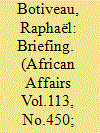

|
|
|
|
|
| Publication |
2014.
|
| Summary/Abstract |
MORE THAN A YEAR AFTER the South African police killed 34 strikers in Marikana, labour unrest continues across the country's mining sector. Industrial actions have targeted platinum giants like Amplats, the world's largest producer, where an 11-day strike over planned retrenchments has just ended and another is looming amid fresh wage talks. Rivalry between the National Union of Mineworkers (NUM) - aligned with the African National Congress (ANC) - and the more recent and militant Association of Mineworkers and Construction Union (AMCU) has also plagued the industry. On 17 October, an NUM branch chairperson at Lonmin - the third largest platinum producer in the world - was shot dead. Another Lonmin NUM shaft steward died in a similar situation on 3 November. A few months ago a former NUM leader who had become the AMCU regional representative in Rustenburg was ambushed - one of several from both sides assassinated since the Marikana massacre. In other words, the 'Framework Agreement for a Sustainable Mining Industry', promoted by South African Deputy President Kgalema Motlanthe and signed by parties to the industry on 3 July 2013, has so far failed to restore peace to the mining sector in Africa's largest economy.
|
|
|
|
|
|
|
|
|
|
|
|
|
|
|
|
| 3 |
ID:
131810
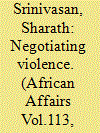

|
|
|
|
|
| Publication |
2014.
|
| Summary/Abstract |
A decade ago international peacemakers turned a blind eye when violence in Darfur, Sudan, first escalated into civil war. This article addresses the war's brutal beginnings, using a close reading of internal communications, interviews, and public statements to deepen our understanding of the predicament that key peacemakers found themselves in, and dug themselves into. For a long first year, when the majority of violent deaths in Darfur occurred, peacemakers employed a set of discursive strategies that intentionally depoliticized Darfur's conflict. Despite knowledge to the contrary, peacemakers carefully avoided connections between Darfur and the ongoing north-south peace negotiations they were championing to end Sudan's long second civil war. These ideational moves gave peacemakers a degree of cover for not responding directly to the conflict, but they also shaped the political calculations and opportunities of domestic actors in ways that further enabled armed violence, ultimately leading to policy failure. The problems of peacemaking in Sudan highlight the particular challenges that arise from negotiating peace. Negotiations give words a privileged place in taming the materiality of violence, yet this also leaves peacemakers liable to shaping new trajectories of political violence born out of local dissatisfaction with the prospects for peace.
|
|
|
|
|
|
|
|
|
|
|
|
|
|
|
|
| 4 |
ID:
131809
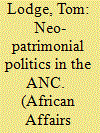

|
|
|
|
|
| Publication |
2014.
|
| Summary/Abstract |
Following Jacob Zuma's ascension to the presidency in South Africa, the African National Congress (ANC) has been dogged by rumours of escalating corruption and the personalization of power. This article documents these trends and explores three ways of understanding neo-patrimonialism in South Africa's ruling party. First, the article addresses the possibility that such political habits have a long history within the ANC but were restricted during its years in exile and have begun to resurface now that the armed struggle is over. Second, it considers explanations that relate to the party's historical ties to criminal networks and pressures arising from the transition to majority rule and contemporary electoral politics. Finally, the article investigates whether neo-patrimonialism is a reflection of broader tendencies within South African political and economic life. All three factors are found to have played a role in the rise of neo-patrimonial politics, and it is the confluence of these trends that explains why these dynamics have taken such a strong hold on the party.
|
|
|
|
|
|
|
|
|
|
|
|
|
|
|
|
| 5 |
ID:
131812
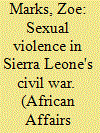

|
|
|
|
|
| Publication |
2014.
|
| Summary/Abstract |
Rape and sexual violence loom large in the study of civil war in Africa. Sierra Leone has been one of the most prominent cases for establishing rape as a 'weapon of war', yet little is known about how sexual violence was understood by commanders or combatants within the Revolutionary United Front (RUF). Mainstream analyses of armed groups and civil war rarely engage with gender dynamics, despite their centrality to war making, power, and violence; and research that does focus on sexual violence tends to overlook the complex internal dynamics of the groups responsible. This article examines the internal gender dynamics of the RUF from the perspective of male and female members in seeking to understand the perpetration of sexual violence. It shows that both formal and informal laws and power structures existed to regulate gender relations and control sexual behaviour within the group. It identifies four categories of women - non-wives, unprotected wives, protected wives, and senior women - and shows that women's interests and experiences of sexual violence were not homogeneous, but were instead shaped by their status within the group. In this way, sexual violence, examined in social context, provides an entry point for understanding how power, protection, and access to resources are brokered in rebellion.
|
|
|
|
|
|
|
|
|
|
|
|
|
|
|
|
| 6 |
ID:
131813
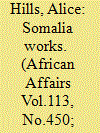

|
|
|
|
|
| Publication |
2014.
|
| Summary/Abstract |
Somalia is an exceptionally insecure state that nevertheless offers an arena in which police officers and institutions can - and do - function. This article argues that Somalia's three regional police forces offer insight into the dynamics that result when locally driven institution-building projects interface with international state-building projects. The resultant picture is nuanced because police negotiate with private actors even as they develop their state-based authority, and their achievements are limited by Somali power brokers sharing a political understanding of security provision, valuing external assistance as a business opportunity, and adapting international models of governance accordingly. Consequently, while the prospects for institution building are favourable, stabilization is unlikely to shift into state building or development.
|
|
|
|
|
|
|
|
|
|
|
|
|
|
|
|
| 7 |
ID:
131811
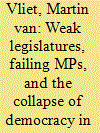

|
|
|
|
|
| Publication |
2014.
|
| Summary/Abstract |
The sudden collapse of Mali's democracy in 2012 revealed the fragility of the state's legitimacy and authority. This article argues that the decay of democracy was linked to the weakness of the country's legislature. Malian MPs collectively failed to scrutinize an increasingly discredited executive and parliamentarians typically operated in isolation from the vast majority of citizens. As a result, rising levels of popular discontent were rarely channelled into the formal political process, and the interests that did enter the political arena were largely restricted to the personal support networks and electoral constituencies of individual MPs. The prevalence of these particularistic interests undermined collective parliamentary scrutiny of matters of national interest. By demonstrating the link between these failures and the collapse of Mali's democracy, this article contributes to the expanding body of literature examining the limited role of African parliaments in processes of democratic consolidation. In doing so it confirms the challenges that executive dominance poses to democratization, while highlighting the importance of representative legislatures to Africa's democracies.
|
|
|
|
|
|
|
|
|
|
|
|
|
|
|
|
|
|
|
|
|